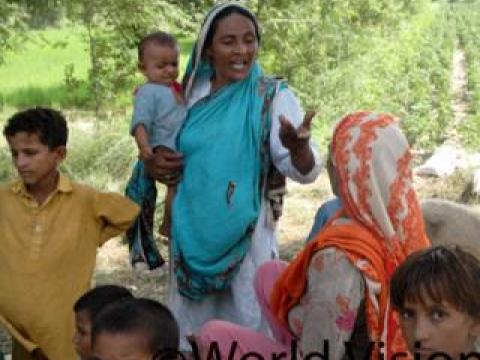Widow and 7 children rendered ‘totally dependant’ by floods

But then life suddenly took a turn for the worse last December. Her young husband died in a road accident rendering her a widow and depending on the charity of others in her village. Six other men from her village of Mauza Wasi Beg of Shahgarrh in Shah Jamal Tehsil also died in the same accident on their way to carry out day labour in Muzaffargarrh city, in Pakistan’s Punjab province.
We had nothing on us save from the clothes we were wearingHer seventh child, a son, was born six months ago– just three months after the death of her beloved husband. This added another set of needs and yet another layer of misery as she struggled to provide for her seven children, including a grown-up daughter for whom she must raise a dowry in order to secure a ‘good’ marriage.
As if the burden of life with seven children without any source of income was not enough, raging floods razed her house to the ground in a matter of seconds when massive waves higher than the ceiling hit on the night of August 13. Families in the area were warned of an impending flood but no one heeded the warning as their village had been spared in the past. Everyone thought the raging waters of the mighty Indus River that breached embankments at Taunsa Barrage, 40 kilometres upstream, would be diverted back into the river near Ghazi Ghat, 15 kilometres upstream.
Naseem and fellow villagers were utterly shocked when towering waves over 12 feet high brought destruction in their wake. “We were asleep when the waters came. The house was raised to the ground in seconds and soon successive waves even washed away the debris. I ran to a high mound nearby with the children from which army boats rescued us in the morning. We had nothing on us save from the clothes we were wearing,” tells a strangely-calm Naseem Bibi.
“I am not the only one facing this disaster. The whole village and the entire area is in the same situation. We have all been living on the side of the Khangarrh to Shahgarrh road and surviving on relief supplies”, she says.
Indeed, millions across the country in Punjab, Sindh and Khyber Paktoonkhwa (KPK) provinces have lost homes and livelihoods. Flooding has already affected the food-producing capacity of Punjab and northern Sindh. Food prices have doubled and even quadrupled in local markets. It is estimated that 3.2 million hectares (or approximately 12,355 square miles) of crops have been destroyed.
I have nothing left to me in this worldWorld Vision has carried out a rapid needs assessment in the area. Food distributions are planned to begin shortly to provide relief to the victims of the biggest flood disaster in the history of Pakistan. Longer-term interventions for rehabilitation and livelihood support are also being planned.
“I have nothing left to me in this world,” says Naseem. “I am totally dependent upon the charity of generous souls sending us relief supplies.”
“God shall provide”, she adds.
Depending on need and access issues across flood-affected areas of the country, World Vision also aims to provide cash-for-work activities to 1,000 people, open seven health posts, set up 20 child-friendly spaces and 20 women-friendly spaces to provide a safe and comfortable environment for children and women in which they can interact with peers and receive support.
World Vision currently has 125 local staff and 14 international staff, of which three are long-term. The organisation plans to recruit an extra 106 staff for the flood response.
-ENDS-